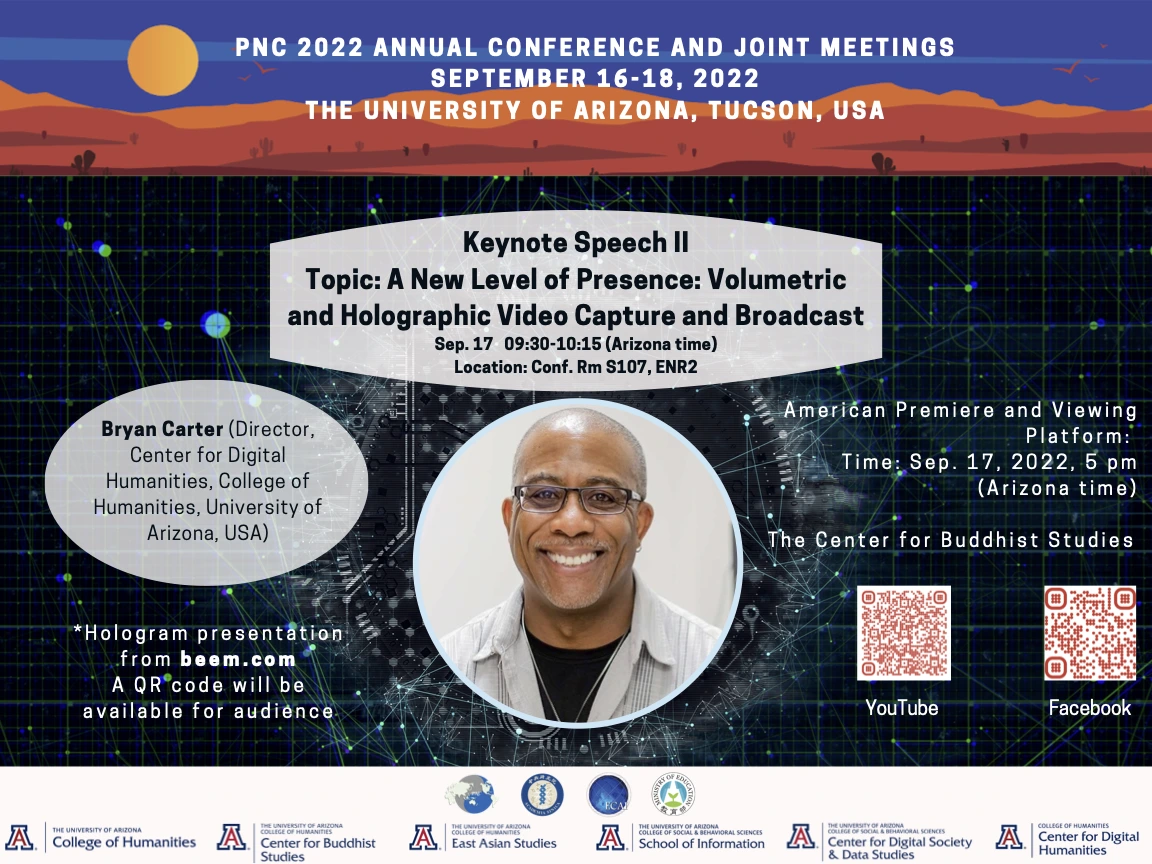
##Update (Sep. 16): Premiere delayed. New time will be announced shortly.
Keynote Speech 2: Saturday, September 17th, 2022 || 9:30-10:15 Arizona Time
Speaker: Director Bryan Carter
Dr. Bryan Carter received his Ph.D. at the University of Missouri-Columbia and is currently the Director of the Center for Digital Humanities and an Associate Professor in Africana Studies, at the University of Arizona. He specializes in African American literature of the 20th Century with a primary focus on the Harlem Renaissance. His research also focuses on Digital Humanities/Africana Studies. He has published numerous articles on his doctoral project, Virtual Harlem, an immersive representation of a portion of Harlem, NY as it existed during the 1920s Jazz Age and Harlem Renaissance. Dr. Carter’s research centers on how the use of traditional and advanced interactive and immersive technologies changes the dynamic within the learning space. Dr. Carter has completed his first book entitled Digital Humanities: Current Perspectives, Practice and Research through Emerald Publishing, and has just completed his second manuscript through Routledge Press, entitled: AfroFuturism: Experiencing Culture Through Technology (coming out June 22). His current work has also led to exploring the African American expatriate experience through immersive and augmented technologies using handheld devices and wearable technologies.
Topic: A New Level of Presence: Volumetric and Holographic Video Capture and Broadcast
I believe it’s safe to say that something is afoot on the AR and VR scene. When my own mother asks me about virtual reality or begins to ask about how to scan a QR code so she can see something that her friend told her that she saw, I know that things are changing. I believe it’s obvious that with all the rumblings of Apple announcing a new headset, the new AR headset by Magic Leap coming out any day, if not already by the time this talk is made, or even the very competitively priced Meta VR headset, beckoning gamers, educators, business leaders, and of course entertainment to take advantage of Meta’s vision of the Metaverse.
With gaming and entertainment leading the way, virtual and augmented reality stand to earn billions of dollars for creators. These technologies are of course also affecting the education sector with more and more educators becoming not just aware of the potential of augmented in virtual reality, but in some cases becoming creators themselves. As universities invest heavily in Digital Humanities initiatives, many Centers for Digital Humanities on those campuses are supporting projects by professors or connected organizations, that deal with augmented or virtual experiences. There are many examples to choose from, from my earliest work with virtual reality back in the late 90s to the works of others who are delving into virtual or augmented experiences for their classes or research. Many like Kim Gallon at Brown University are incorporating mapping and GIS information to supplement these virtual or augmented experiences, bringing a critical awareness of social inequalities through these visual technologies. These tools are perfect for creating higher degrees of empathy, for engaging students in interactive and creative ways, to teach students skills and expose them to methods of digital storytelling. These tools prepare them for different levels of expression that we hope will stay with them beyond their experience in our classes.
At the Center for Digital Humanities, we are, of course, interested in all those things. We work with faculty, groups, and organizations both on and off campus, to include a host of cultural centers. Our aim like many centers, is to expose and empower our students and faculty as well as community partners surrounding our campus. I can speak for the Center for Digital Humanities in that one of our direct missions is to work with underserved communities, where often these technologies are rarely incorporated into many levels of their programming, if at all. Two of the more interesting technologies that I believe are part of the future of where these immersive experiences are heading are Holographic and volumetric video capture and streaming. Both have the potential to revolutionize the ways we communicate, interact with one another, and engage content. Our work with the use of volumetric and holographic video is adding to the conversation on ways we can engage complex topics that are systemic within our society. Our journey into volumetrics is exciting, and through this talk I’d like to share with you some of our findings.

